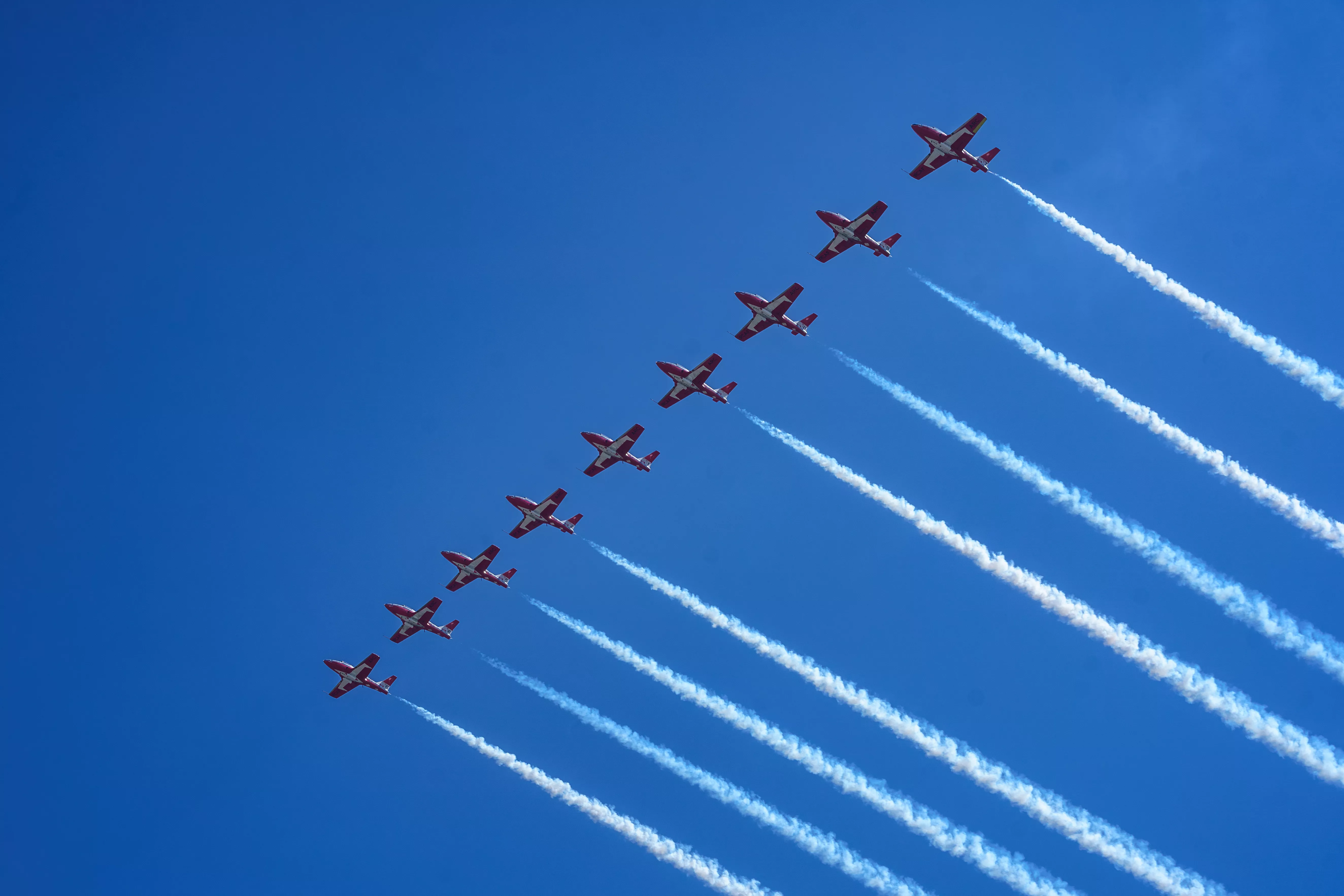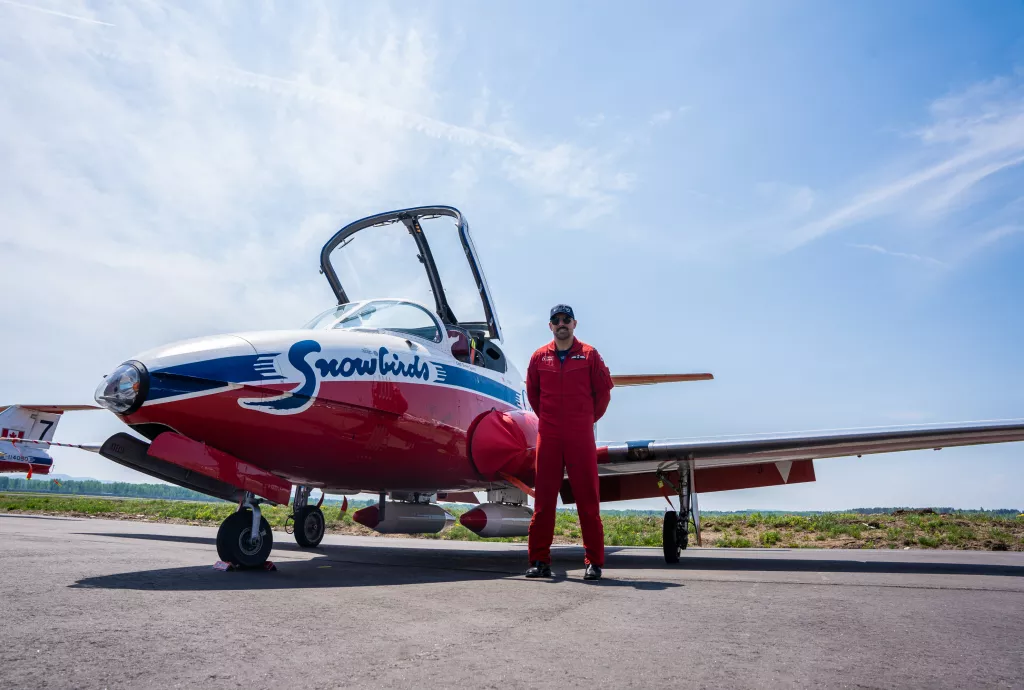From Confederation College to the Snowbirds: Captain Steven Sparks' Journey in the Skies
Posted:
By Scott Hobbs
In the fast-paced, adrenaline-fueled world of flying, few names reverberate as loudly as The Snowbirds, Canada’s Air Force Demonstration Squadron. I recently had the honour of interviewing Captain Steven Sparks, also known as Snowbird 6. This high-flyer, in his 4th season with the team, has tales of racing through the sky in his Canadair CT-114 Tutor are as captivating as his early journey to the cockpit. Sparks, a proud alumnus of Confederation College's Flight Management Program, has an extraordinary story to tell. His experiences, insights, and anecdotes not only illuminate the intense world of flying in the military, but also give a fascinating glimpse into the rigorous training and unwavering determination needed to ascend in this demanding field.
Scott: Captain Sparks, it’s an absolute privilege to speak with you. Can you give us a brief overview of your journey from graduation to joining the Snowbirds team?
Captain Sparks: Sure thing. I was in Hamilton at the time, attending university and interested in joining the military as a pilot. While waiting for the application process to open up, I met an ex-pilot at a recruiting center in Hamilton who recommended that I gain some flying experience in the meantime. I researched various options and came across Confederation's flight program, which offered many attractive opportunities, including the chance to move up to a place like Thunder Bay, which appealed to my love for the outdoors. Additionally, the subsidized tuition fee was a huge draw for me as a student. At the time, Confed's float program was also in place, which was a unique opportunity to learn. I applied for the program, underwent all the training at the college, and had an amazing experience that allowed me to meet many people, including my wife. After completing the program, I worked for a while before finally joining the military and beginning basic training.
The experienced instructors, with over 30 years of flying experience, shared a wealth of knowledge about the industry.
S: What inspired you to pursue a career in aviation, and how did your time at the college contribute to your passion for flying?
CS: Well, it's kind of a random story. I used to play football growing up, and that was my passion at the time. When my football career came to an end after university, I was looking for something that was hands-on and professional. I wasn't sure what that was going to be, but I had grown up in an Air Force family, and that had always piqued my interest in aviation. So, I did some research and discovered that with my university degree, I had the potential to pursue flying. And the flight management program at the college provided everything I needed to learn the ropes of aviation. The experienced instructors, with over 30 years of flying experience, shared a wealth of knowledge about the industry. Overall, the program was instrumental in preparing me for the challenges and opportunities I have encountered as a pilot.
S: How did your time at college prepare you for the challenges and opportunities you've encountered as a pilot so far?
CS: The flight management program taught me everything I needed to know about starting out as a pilot. My background had nothing to do with aviation, except for having Air Force parents. I grew up with no exposure to flying, except for the few times we attended an air show in Hamilton and saw things like the Snowbirds. The college is a great place with great people who provided everything I needed to learn the ropes from the beginning. Some of the instructors at ACE (The College’s Aviation Centre of Excellence), had over 30 years of flying experience in and around these areas, and with the airlines that operate around Thunder Bay, which provided us with a ton of knowledge and experience.

S: Can you share a memorable experience from your time at the college?
CS: Sure, I have a few memorable experiences. The first one was the float program which gave me the opportunity to go to Shebandowan, spend time in the summer flying floats. It was an awesome and cool exposure that I still look back at as being some of the best flying I've ever done. Meeting my wife in the program and the friends I made, are long-lasting. I knew coming back here to Thunder Bay, I'd be connecting again with a bunch of people. It also allowed me to connect with people at all of the local airlines. The community is tight-knit, and that was really cool.
S: Shifting gears a bit, what advice would you give to current or future students at the college flight management program who are aspiring to a career in aviation?
CS: My advice would be to listen to the experiences of the instructors. They bring a wealth of knowledge from different aspects of aviation. For example, Andy Hay has extensive float experience while Sherri Appleton comes from an IFR (Instrument Flight Rules) background. The instructors at the college offer a really diverse range of experiences. If you can make an impression with them, you can connect and network with actual jobs in the aviation industry. Think of the flight program as a two-year job interview.
S: Can you tell us how your experience with the Snowbirds has influenced your perspective on aviation and teamwork?
CS: As a pilot, I have a unique perspective. My wife and I both fly, but we're not the typical aviation enthusiasts who eat, sleep, and breathe aviation. We have diverse interests outside of flying. Initially, we were unsure if flying would be a lifelong career for us. However, what I love about the military aspect is the teamwork. As a kid, I played sports, and that's what attracted me to the team. When I saw the members of the Snowbirds team, I had flown with some of them before, and I wanted to be part of that team.
S: So military flying is similar to team sports?
CS: It absolutely is. Especially the emphasis on training, communication, and coordination. The bond formed between team members of the Snowbirds is the highlight of military flying, and flying with your teammates can be a beautiful experience too. As they say, every day is a sunny day when you're flying above the clouds.
S: What was your most exciting experience with the Snowbirds so far? Was it the first time flying in a show or just taking off in one? What stands out to you?
S: You feel like you’re walking into a fire hose when you come to the snowbirds, regardless of whether you're coming from like thousands of hours on a (CF-18) Hornet with a ton of combat experience, or you're walking out of training, fresh off being a student to maybe a junior instructor, which is what I was. You spend those first three weeks with everything coming at you, and you just can’t keep up. It gives you a sense of humility and reminds you of where you started. Once you get through that and you find out that you've made the team, then there's that first time they unleash you and say, you're good to go on your own. I think it was that first time for me. You're flying in formation, on your own in the cockpit; the silence is there and you're just trusted by the people around you. That was the biggest feeling of “wow” for me. There's a sense of responsibility and freedom that came with that.
Accepting, recognizing, and learning from our failures is crucial. In aviation, you'll face challenges that can be discouraging, but it's essential to have the right attitude. How you handle and cope with failure is vital for success as a pilot.
S: For the benefit of current and future students, what are some of the key skills and attributes you believe are essential for somebody who wants to fly?
CS: Whether in the military, flying fast jets or helicopters, or performing precision flying like the Snowbirds, or even flying a Cessna on floats, the key is persistence through failure. This applies both when learning to fly and at the level I’m flying at now. We must accept that we'll never completely nail it, and that mistakes will happen along the way. After each flight, we debrief and acknowledge our errors. We'll continue doing this until the end of our careers. Accepting, recognizing, and learning from our failures is crucial. In aviation, you'll face challenges that can be discouraging, but it's essential to have the right attitude. How you handle and cope with failure is vital for success as a pilot.
No matter what you're going to do in aviation, there's tons of opportunities and cool things.
S: I think that's really neat that you met your partner in the program too.
CS: She got hired as an intern to come up and instruct. I think it was for two years. And then she moved on to Wasaya on the Pilatus and then on to Bearskin on the Metroliner. Then she went to Jazz and now at Air Canada.
It's been fascinating to see our aviation careers take different paths, yet still be able to share our experiences. Often, we look at like it like the grass is greener on the other side. There are always people in the military that say, I can't wait to get there, Air Canada, or another carrier, it's for life; you don't have to worry about military. And of course, I'm hearing the other side from her, like, you've got so much advantage being in the military. But no matter what you're going to do in aviation, there's tons of opportunities and cool things.
S: I was going to say, there's the appeal of flying the big passenger jet and making Air Canada money, but then there's also the, you know…
CS: I'm upside down looking down at the audience on the ground below and being like, “you don't get to do that. (laughing)”


